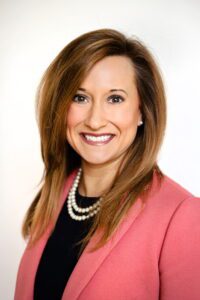 Alexanderia Honeycutt’s (‘03) career has taken her around the world and into the offices of politicians and changemakers. It also allowed her to become a partner at a lobbying agency firm, and finally, to launch her own government relations and consulting firm, Honeycutt Strategies, in 2012. She says none of it would have happened if she hadn’t transferred to the University of Tennessee, Knoxville, and landed School of Communication Studies Associate Professor John Haas as an advisor.
Alexanderia Honeycutt’s (‘03) career has taken her around the world and into the offices of politicians and changemakers. It also allowed her to become a partner at a lobbying agency firm, and finally, to launch her own government relations and consulting firm, Honeycutt Strategies, in 2012. She says none of it would have happened if she hadn’t transferred to the University of Tennessee, Knoxville, and landed School of Communication Studies Associate Professor John Haas as an advisor.
“I absolutely love what I do and I very well could have had a different trajectory for my path if the right person had not met me and pushed me in the right direction,” Honeycutt said.
Embracing Communications Studies
While she had spent the first two years of her undergraduate schooling on a cheerleading scholarship at the University of Louisville in Kentucky, it was her time at UT’s College of Communication and Information that shaped her mind and future career. Haas was integral in that he saw in her a proficiency for public speaking, which is something that the self-labeled introvert said she would have never picked for herself—but Haas’s assessment of her potential proved to be very accurate.
She had taken marketing classes in Kentucky and was interested in either speech communication or advertising and public relations, so she started out her junior year at CCI taking classes in both areas.
“I loved the advertising aspect, but I absolutely thrived on the speech communications side, and that was something I never myself would have in a million years thought I would go into,” she said.
A Career in Government Relations
Haas played another pivotal role in her journey yet again when she took the capstone class for communication studies majors and asked students to interview someone who held a communications job they would be interested in doing someday. While Honeycutt was set to go to law school after she graduated, she thought about a communications position that piqued her interest and fit her skillset, and settled on press secretary.
“So I literally got out the yellow pages and looked for Senator Lamar Alexander’s press secretary and I called the Knoxville office. The person who answered was the state director who just happened to be in the office that day, and when I told him what I wanted to do, he said, ‘Can you come in tomorrow?’,” she recounted.
That conversation led to an interview with Alexander’s press secretary, which led to an internship at his Knoxville office. Then, just before graduating, Honeycutt realized she didn’t want to go to law school after all—and that led to a full-time job at Alexander’s Knoxville office. One school assignment and a cold phone call turned into the makings of an entire career that took Honeycutt all the way to where she is now.
Giving Back to Her School
Throughout it all, she has never forgotten how integral of a role the School of Communication Studies played in her career development. That’s why she began chatting with Haas a few years ago about ways to support students in the major, and she’s been financially giving back to the school ever since.
“I truly would not be in this position if it wasn’t for one particular teacher, Dr. Haas. I first started giving because I came to him and said, ‘What do you need for your students?’,” she said. “I feel very grateful to be in the position that I’m in to be able to give. I really like feeling that it’s going toward something specific and something good.”
For Honeycutt, being able to give for a specific purpose makes her donations fulfilling, such as the time she was able to fund a student to go on the comm studies Ireland study abroad trip.
She likes to look for ways to contribute to the school that will make an impact, and that’s not limited to just fiscal donations—Honeycutt also helped establish the Speech Communications Advisory Board with Haas, and has chaired it for five years.
Additionally, she was the first person to coordinate with Haas when he started bringing speech communication students to Nashville for day tripsdaytrips to meet professionals in the field. Honeycutt helped coordinate speakers and activities for the students, and she’s stayed involved with that trip over the years.
“I think people are starting to realize there’s a younger generation that wants to contribute and wants to give back and it looks very different than it did 10 or 20 years ago,” she said. “They want to be able to say, this is what I did. I think it makes the younger generation feel like more a part of the community when they give back.”
